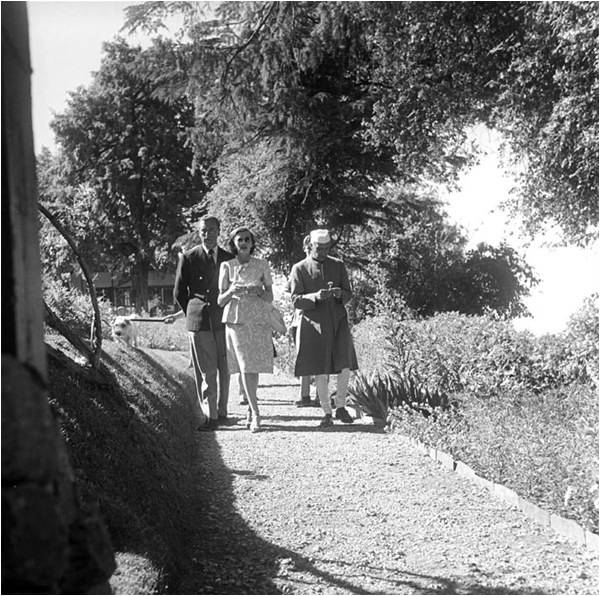
This is a photograph of India’s first prime minister Jawaharlal Nehru and Earl and Countess Mountbatten strolling during a holiday in Simla in May 1948.
Lord Louis “Dickie” Mountbatten was the last British Viceroy and first Governor-General of independent India. He and his wife Edwina became and remained close friends of Jawaharlal Nehru and other leading members of the Indian cabinet. Their younger daughter, Pamela, spent 18 formative months in India and had a ringside view of the events leading up to and beyond Independence. She also had firsthand experience of meeting and talking to many of India’s founding fathers, including Mahatma Gandhi, Jawaharlal Nehru, Vallabhai Patel, C. Rajgopalachari and others.
Pamela called Nehru ‘mamu’ (uncle) for some months, but then reverted to the commonly used title of Panditji because she thought it sounded less presumptuous. But her mother called him Jawahar from day one. And he, in turn, called her Edwina.
Nehru and Edwina Mountbatten loved and respected each other, Pamela wrote in a book recently published in India. The book, Daughter of Empire: Life as a Mountbatten, was first published in 2012 in the United Kingdom and later released in India.
Pamela writes that her mother and Nehru shared a “profound relationship” that bloomed after Edwina arrived in India along with her husband.
Pamela was 17-years-old then and says that she saw the first stages of what would go on to become a relationship based on “equality of spirit and intellect.”
"She found in Panditji the companionship and equality of spirit and intellect that she craved,” Pamela is quoted as saying about her mother.
As the Mountbattens prepared to leave India, Edwina wanted to gift Nehru an emerald ring, her daughters writes in the book. However, Edwina knew that Nehru would not accept this and she handed the jewel over to Indira Gandhi, Nehru’s daughter.
During the farewell party organised for the Mountbattens, Nehru addressed Edwina directly.
“Wherever you have gone, you have brought solace, you have brought hope and encouragement,” Pamela quotes Nehru as saying. “Is it surprising, therefore, that the people of India should love you and look up to you as one of themselves and should grieve that you are going?”
Lord Louis “Dickie” Mountbatten was the last British Viceroy and first Governor-General of independent India. He and his wife Edwina became and remained close friends of Jawaharlal Nehru and other leading members of the Indian cabinet. Their younger daughter, Pamela, spent 18 formative months in India and had a ringside view of the events leading up to and beyond Independence. She also had firsthand experience of meeting and talking to many of India’s founding fathers, including Mahatma Gandhi, Jawaharlal Nehru, Vallabhai Patel, C. Rajgopalachari and others.
Pamela called Nehru ‘mamu’ (uncle) for some months, but then reverted to the commonly used title of Panditji because she thought it sounded less presumptuous. But her mother called him Jawahar from day one. And he, in turn, called her Edwina.
Nehru and Edwina Mountbatten loved and respected each other, Pamela wrote in a book recently published in India. The book, Daughter of Empire: Life as a Mountbatten, was first published in 2012 in the United Kingdom and later released in India.
Pamela writes that her mother and Nehru shared a “profound relationship” that bloomed after Edwina arrived in India along with her husband.
Pamela was 17-years-old then and says that she saw the first stages of what would go on to become a relationship based on “equality of spirit and intellect.”
"She found in Panditji the companionship and equality of spirit and intellect that she craved,” Pamela is quoted as saying about her mother.
As the Mountbattens prepared to leave India, Edwina wanted to gift Nehru an emerald ring, her daughters writes in the book. However, Edwina knew that Nehru would not accept this and she handed the jewel over to Indira Gandhi, Nehru’s daughter.
During the farewell party organised for the Mountbattens, Nehru addressed Edwina directly.
“Wherever you have gone, you have brought solace, you have brought hope and encouragement,” Pamela quotes Nehru as saying. “Is it surprising, therefore, that the people of India should love you and look up to you as one of themselves and should grieve that you are going?”

